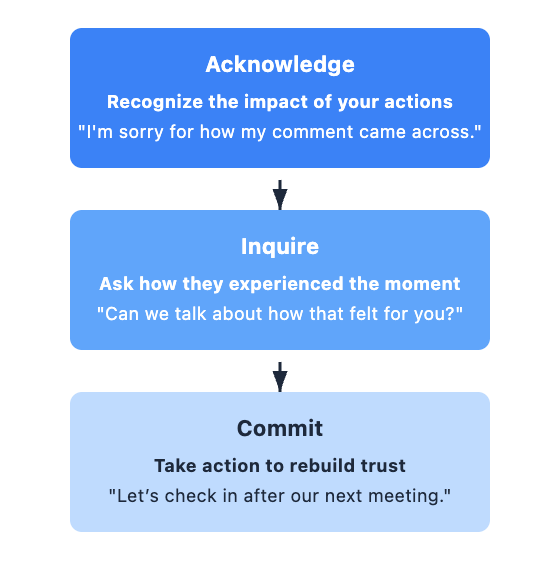Restoring trust after a disagreement is one of the most important skills you can develop for sustaining a healthy, resilient team. In this unit, you’ll learn how to acknowledge harm, clarify intent, and take meaningful steps to repair relationships so that conflict becomes a moment for growth, not a source of lasting division.
Even on strong teams, conflict can leave behind doubts or hurt feelings. If these are left unaddressed, they can quietly erode collaboration and morale. Taking the time to repair trust shows your commitment to the relationship and to the team’s long-term success. For example, after a tense exchange, you might notice a teammate is less engaged during team meetings. Addressing this directly rather than ignoring it, or trying to move past it without acknowledging the underlying tension can make all the difference.
Rebuilding trust is about more than just saying “sorry.” It involves three key actions: acknowledging the impact, clarifying your intent, and following through on repair. You can use the AIC Framework—Acknowledge, Inquire, Commit—to guide your conversations after conflict:

Here’s a realistic example of how two teammates can use the AIC Framework to rebuild trust after a tense moment:
- Jessica: Hey Chris, do you have a minute to talk about yesterday’s meeting?
- Chris: Sure, what’s up?
- Jessica: I realized my feedback came out pretty blunt, and I’m sorry for how that might have felt. That wasn’t my intention. (Acknowledge)
- Chris: I did feel a bit put on the spot, to be honest.
- Jessica: Thanks for telling me. I really value your input, and I want to make sure we’re good moving forward. Is there anything I can do differently next time? (Inquire)
- Chris: I appreciate you bringing it up. Maybe just a heads-up before sharing feedback in front of the group would help.
- Jessica: Absolutely, I can do that. Let’s check in after our next team meeting to see how it goes. (Commit)
In this exchange, Jessica uses the AIC Framework: she acknowledges the impact of her actions, inquires about Chris’s perspective, and commits to a specific change and a follow-up, demonstrating accountability and care.
By observing this dialogue, notice how the focus is on understanding, repair, and concrete next steps—rather than defensiveness or blame.
Making trust repair a habit will strengthen your credibility and your team’s resilience. As you practice these skills, you’ll find that even tough moments can lead to deeper understanding and stronger relationships. In the upcoming role-play, you’ll have the chance to apply these techniques in a realistic scenario—helping you build confidence in navigating post-conflict conversations with care and integrity.
